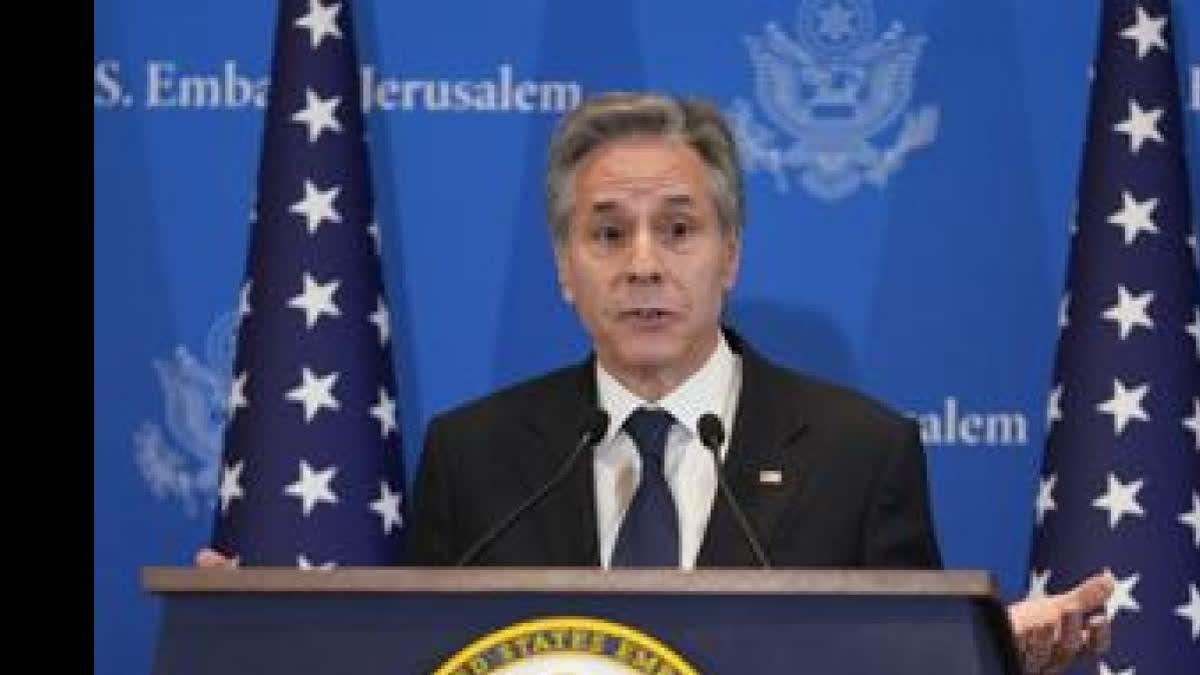Jerusalem: U.S. Secretary of State Antony Blinken said Wednesday that a cease-fire and hostage-release agreement between Israel and Hamas was still possible, despite the two sides being far apart on the central terms for a deal.
Blinken was in the region trying to broker an arrangement that could bring some respite in Israel's war against Hamas, which is entering its fifth month after killing more than 27,000 Palestinians, displacing much of the territory's population and sparking a humanitarian catastrophe.
Those diplomatic efforts were rattled earlier in the day when Israeli Prime Minister Benjamin Netanyahu rejected a detailed, three-phase plan by Hamas that would unfold over 4 1/2 months. The plan stipulated that all hostages would be released in exchange for hundreds of Palestinians imprisoned by Israel, including senior militants, and an end to the war.
Netanyahu, who called Hamas' plan "delusional," dismissed any proposal that leaves the militant group in full or partial control of Gaza. Netanyahu said military pressure was the best way to free the roughly 100 hostages held in the Gaza Strip, where they were taken after Hamas' cross-border rampage into southern Israel on Oct. 7, which sparked the war. Israel has made destroying Hamas' governing and military abilities one of its wartime objectives, and Hamas' proposal would effectively leave it in power in Gaza and allow it to rebuild its military capabilities.
But Blinken downplayed the posturing, saying it was part of the arduous negotiating process. "It's not flipping a light switch. It's not yes or no," he said. "While there are some clear non-starters in Hamas' response, we do think it creates space for agreement to be reached, and we will work at that relentlessly until we get there," he said. Blinken is trying to advance the cease-fire talks while pushing for a larger postwar settlement in which Saudi Arabia would normalize relations with Israel in return for a "clear, credible, time-bound path to the establishment of a Palestinian state." But the increasingly unpopular Netanyahu is opposed to Palestinian statehood, and his hawkish governing coalition could collapse if he is seen as making too many concessions.
HAMAS SPELLS OUT DEMANDS FOR HOSTAGE DEAL-Hamas' statements came in response to a proposal drawn up by the United States, Israel, Qatar and Egypt. The militants' reply was published in Lebanon's Al-Akhbar newspaper, which is close to the powerful Hezbollah militant group.
A Hamas official and two Egyptian officials confirmed its authenticity. A fourth official familiar with the talks later clarified the sequencing of the releases. All spoke on condition of anonymity because they were not authorized to brief media on the negotiations.
In the first 45-day phase, Hamas would release all remaining women and children, as well as older and sick men, in exchange for an unspecified number of Palestinian prisoners held by Israel. Israel would also withdraw from populated areas, cease aerial operations, allow far more aid to enter and permit Palestinians to return to their homes, including in devastated northern Gaza.
The second phase, to be negotiated during the first, would include the release of all remaining hostages, mostly soldiers, in exchange for all Palestinian detainees over the age of 50, including senior militants.
Israel would release an additional 1,500 prisoners, 500 of whom would be specified by Hamas, and complete its withdrawal from Gaza.
In the third phase, the sides would exchange the remains of hostages and prisoners.
VICTORY IN 'A MATTER OF MONTHS'-At the news conference earlier, Netanyahu rejected Hamas' demands, saying they would lead to a disaster for Israel. "Surrendering to Hamas' delusional demands that we heard now not only won't lead to freeing the captives, it will just invite another massacre," Netanyahu said in a nationally televised evening news conference.
